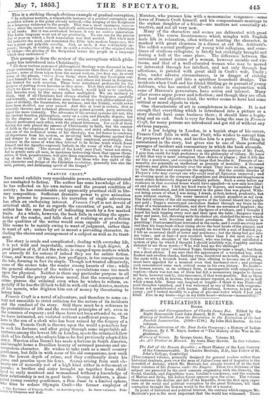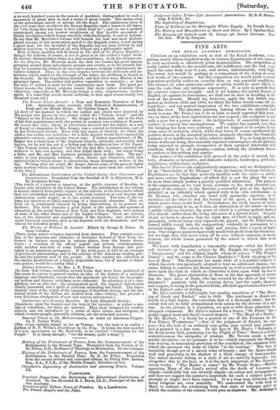PUBLICATIONS RECEIVED.
Boors.
Memorials and Correspondence of Charles James Fox. Edited by the
Right Honourable Lord John Russell, M.P. Volumes I. and IL
History of Scotland from the Revolution to the Extinction of the last Jacobite Insurrection. (1689-1748.) By John Hill Burton. In two volumes.
The Administration of the East India Company; a History of Indian Progress. By J. W. Kaye, Author of "The History of the War in Af- ghanistan." History of Greece. By George Grote, Esq. Volume XI. An Art 'Student in Munich. By Anna Mary Hewitt. In two volumes.
The Fall of the Roman Republic ; a Short History of the Last Century of the Commonwealth. By Charles Merivale, B.D., late Fellow of St. John's College, Cambridge. [This compact volume, primarily designed for general readers rather than historical students, goes over the rens of Julius Caisar and of Augustus to the downfall of Antony, which Mr. Merivale has already treated of in the first three volumes of his Romans under the Empire. These two divisions of the subject are preceded by the civil contests originating with the Gracchi, the Social, Gaulish, and Jugurthine wars, Catiline's conspiracy, and the contests of Marius and Sylla, till Julius Ca3sar appears upon the scene. The volume thus embraces the decline and fall of the Republic, from the first open expo- sure of its social and political corruption by the great Tribunes, till that corruption brought the Roman world to the feet of a master.
In point of historical and political interest, the century which engages Mr. Merivale's pen is the most important that the world has witnessed. There
is we such hundred years in the annals of mankind, distinguished by such a succession of great men or such a series of great events. The names even of the subordinate actors or actions fill the mind. The continuous story of the civil wars that overthrew the Roman Republic read a lesson to all times, for "the thing that has been is that which shall be"; and we see a modern counterpart among our nearest neighbours of that terrible succession of bloody revolutions which began remotely with the Gracchi, to end at Actium. To arty that Mr. Merivale's volume will furnish the best and most philoso- phical account of this momentous period to the English reader, is not saying a great deal ; for the downfall of the Republic has not been written by any modern historian, or indeed at all with fulness and a philosophic spirit. Both of these qualities will be found in The Fall of the Roman Republic ; though the fulness, of course, is not so great as in the author's larger work. In literary characteristics there is a close resemblance. As in his Romans un- der the 2mpire, Mr. Merivale made the first two Caesars his great figures, grouping around them subordinate persons and events, so in his present his- tory he presents his subjects in successive masses, keeping contemporary in- cidents subdued. Thus, in the civil disputes between the plebeians and pa- tricians, which ended in the triumph of the latter, the attention is drawn to the Gracchi. In the Jugurthine, Gaulish, and first Civil wars, Marius is the principal figure. The author still prefers exposition to narrative ; so that the story of actions is sunk for the commentary upon them. The great po- litical lessons the history contains render this mode rather desirable than otherwise, especially as Mr. Merivale brings a calm, dispassionate, modern spirit, if a somewhat severe moral criticism, to bear upon events nearly two thousand years old.] The Female Jesuit Abroad: a True and Romantic Narrative of Real Life. Including some Account, with Historical Reminiscences, of Bonn and the Middle Rhine. By Charles Seager, M.A.
[A story of the manner in which the author and others were deceived by the person who figures in two stories called the "Female Jesuit" and the "Sequel to the Female Jesuit." Mr. Seager is a Romanist, and at the time of his first acquaintance with the person in question was residing at Brussels. Of course this lady, whom he afterwards received into his family as a sort of friend or companion to Mrs. Selmer, was a convert to Catholicism, cast off by her Protestant friends. Even with this source of interest, we think the author was rather too credulous; for a little inquiry would have exposed his attractive convert, and inquiry was so easy. A. former acquaintance of Mr. Seeger was a clergyman of the Anglican Church, clerically and socially well known, for he was the son of a bishop and the brother-in-law of Dr. Pusey. "The Female Jesuit Abroad" killed off the first Mrs. Luxmore, married the widower to her own mother, and then killed them both ; the whole being a fable, and Mr. and Mrs. Luxmore probably alive to this time. The nar- rative is very pleasantly written ; clear, fluent, and attractive, with that spirited fulness which seems to characterize many Romanist writers of the day. Writing after the event, Mr. Seeger throws some of his present lights upon matters which comically lets the reader see more than the author saw at the time.]
The Educational Institutions of the United States, their Character and Organization. Translated from the Swedish of P. A. Siljestrom, M.A. By Frederica Rowan. ):The result of a journey to America, at the public expense of Sweden, to inquire into education in the United States. The information in the volume is mainly derived from public reports on the schools, or the laws under which they are established and regulated, with such correction as oral inquiry and examination could supply, as to the actual working. The tone of the vo- lume has therefore at times something of a blue-book character. This of- ficial air is continually relieved by living observations, or by general re- flections. The book contains a good digest of the schools and systems of education in the model States of New York and New England, with notices of some of the other States and of the higher Colleges : there are notices, too, of the character and qualifications of the teachers ; and sketches of quasi historical questions, such as the disputes with the Romanists, and the schools for Coloured people.] The Works of William H. Seward. Edited by George E. Baker. In three volumes.
[Three bulky octavo volumes imported from America. They contain a por- tion of the speeches and addresses of Governor Seward of New York, de- livered on various occasions in various places, from the Senate down- wards ; a selection of his official papers and private correspondence, with another selection of some letters written from Europe and pub- lished in an American newspaper. If the workpays, it will be an example of provincial partisanship, and of the activity of the American reading pub- lic and the patriotic zeal of the people. In this country the collection of the similar productions of a highly respectable man, but of second or third- rate genius, would be a losing affair.] Italian Literature. By Mrs. A. F. Foster.
['In form this volume resembles several books that have been published of late years to convey to general readers an idea of the history of a national language and literature, except that the specimens are fewer, the biographi- cal notices and literary criticisms more elaborate. In substance it is a com- pilation, but an able one ; the arrangement good, the digested information clearly presented, and a spirit of criticism animating the whole. The intro- ductory view of the origin of the languages of Southern Europe and the his- torical sketch of the Italian are derived from other writers, but present a very felicitous abridgment of new and curious information.]
Gatherings of a Country Rambler. By Lady Elizabeth Dickins. [Questions upon the Gospels and the Acts of the Apostles ; or rather a spe- cies of catechism, for there are answers. They seem designed for country schools, and are introduced by a series of short stories and dialogues, in which country-people, generally children, are the principal persons.] Summer Cruise in the Mediterranean, on board an American Frigate. By N. Parker Willis.
[The cruise extends inland as far as Vienna; but the book is in reality a portion of N. P. Willis's Pencillings by the Way. It forms the first number of a new speculation by Mr. Bosworth, to be entitled "Literature for the People." It is cheap enough ; " for the money, quite a heap."] History of the Protestants of France, from the Commencement of the Reformation to the Present Time. Translated from the French of G. De Felice, D.D., Professor of Theology at Montauban. In two volumes. History of the Protestants of Francs, from the Commencement of the Reformation to the Present Time. By G. De Felice. Translated from the second revised and corrected edition, by Philip Edw. Barnes, Esq., B.A., F.L.S., of the Middle Temple, Barrister-at-law.
Chambers's Repository of Instructive and _Amusing Tracts. Volume IIL
YamPanzris.
Practical Suggestions for Reforming the Educational Institutions of Scotland. By the Reverend R. J. Bryce, LL.D., Principal of the Bel- fast Academy. Demerara after Fifteen Years of Freedom. By a Landowner. The French Empire and the P0148. Judgment before Trial—Life Assurance Associatio,:s. By B. H. Strom- berg, F.R.G.S., &o.
The Sophistry of Empiricism.
Notes of Evidence on the Metropolis Water Supply. By Joseph Boult. The History and Manufacture of Boots and Shoes. By J. Sparked] Hall. The Dragon. ofe Oxfords wade St. George ofe Sainte Stevens. Part the first. Writ by Pasquin.



























 Previous page
Previous page